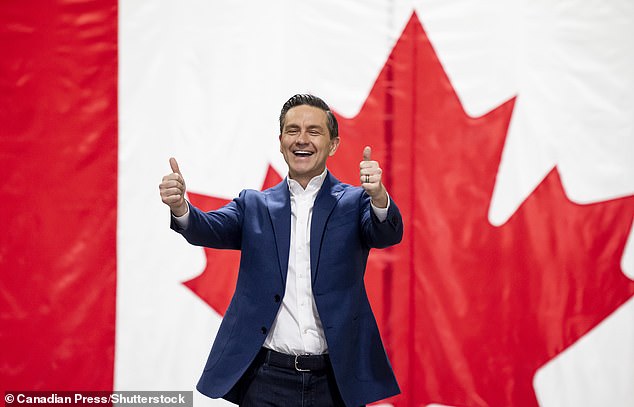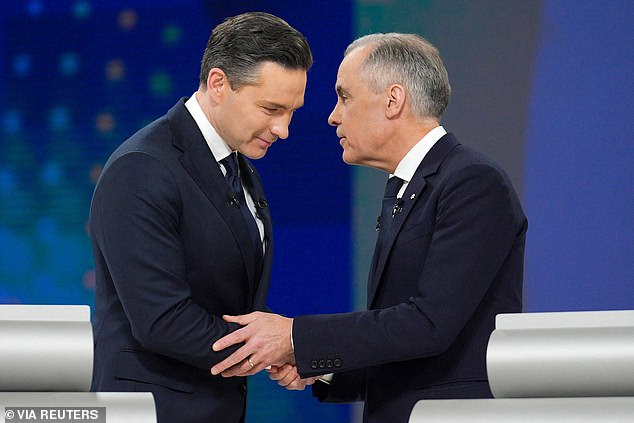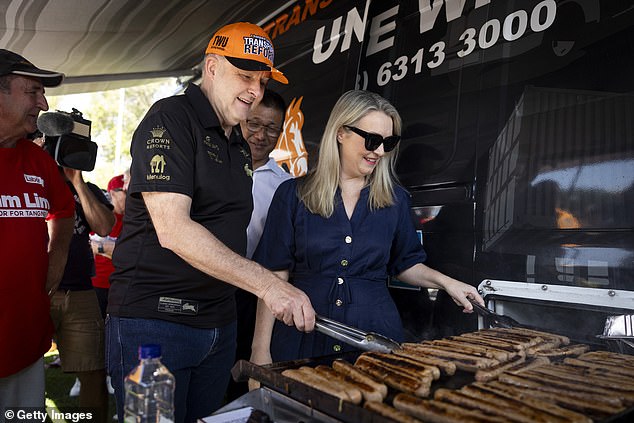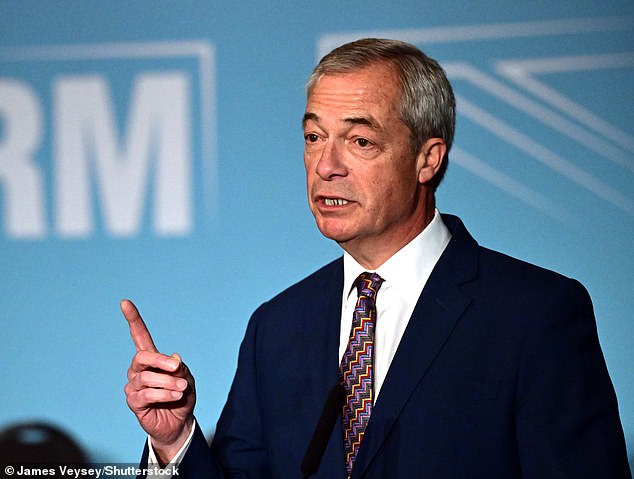Three months of chaos and confusion emanating from the Oval Office have not been good for Donald Trump‘s popularity.
He entered the White House on January 20 with an average approval rating of +6 per cent. That has since slumped into negative territory, with his average approval rating now -4 per cent – a 10-point shift against him.
The most recent polls suggest it’s getting worse. This week, YouGov had his approval rating down 14 points since Inauguration Day, with even 20 per cent of his own voters disapproving of how he’s handling the economy.
Trump, of course, can persevere with unpopular policies if he is so minded because he will never have to face the voters again (despite his mad musings about running for an unconstitutional third term). But he is doing no favours to those in other countries who donned the Trump mantle in the hope it would sweep them to power too.
Nigel Farage and his Reform Party should take urgent note.
One of the unforeseen aspects of Trump’s presidency is that he has proved a boon to struggling Left-wing governments in foreign countries. On the eve of Trump’s return to power, Canada‘s Liberal government was more than 20 points behind the Conservative opposition and heading for a thumping defeat – so much so that Justin Trudeau, Prime Minister and poster child for all that is woke, resigned.
Then along came Trump, penalising Canadian exports with high tariffs for no good reason, demeaning Canada by proposing, absurdly, that it becomes the 51st American state, disrespecting its leader by referring to its PM as a ‘governor’ and claiming, wrongly, that the US subsidised Canada to the tune of $200billion a year.

Canadian Conservative Party leader Pierre Poilievre gives the thumbs up during an election campaign rally. His slogan ‘Canada First’ is too much an echo of Trump for voters whose top demand is a PM who will ‘stand up to Trump’, writes Andrew Neil

Pierre Poilievre and Liberal leader Mark Carney shake hands following a debate in Montreal on Thursday. The latest poll shows Liberals and Conservatives nip and tuck
The Canadian Conservative lead in the polls soon vanished like snow in the summer. The latest JL Partners poll for the Daily Mail shows Liberals and Conservatives nip and tuck, with the Liberals favourites to hold on to power because they’re nine points ahead in the parliamentary seat-rich province of Ontario.
Pierre Poilievre, the Right-wing Conservative leader who, until a few months ago, was mentally measuring up the curtains for the PM’s official residence in Ottawa, now faces an uphill struggle come the general election on April 28.
Mark Carney, of Bank of England fame – but virtually unknown in Canada, where only 5 per cent had heard of him before he replaced Trudeau as PM – has presided over a surge in Liberal support from its record low only two months ago.
Almost six out of ten Canadians still think their country is going in the wrong direction. They like many of Poilievre’s policies. But his slogan ‘Canada First’ is too much an echo of Trump for voters whose top demand is a PM who will ‘stand up to Trump’.
Poilievre is now smeared as ‘Maple Syrup MAGA’. What should have been a watershed ‘change’ election for Canada, marking a distinct move to the Right, looks like returning a tired Liberal government under new leadership.
Such has been the Trump effect.
Association with Trump has been almost as toxic in Australia, which goes to the polls on May 3. Only a month ago, the Conservative opposition led by Peter Dutton was tied, with an unpopular Labour government led by Prime Minister Anthony Albanese.
Then, unwittingly, Trump worked his electoral ‘magic’ Down Under too.
When Trump was re-elected last November, only 40 per cent of Australians thought he would be bad for Australia. That’s now risen to 68 per cent, not good news for Dutton, perceived to be aligned with Trump even if, in reality, he’s a dull cove. The two men have little in common.
But Dutton’s ‘Make Australia Great Again’ slogan allowed critics to claim his campaign was just a cut-and-paste of Trump’s MAGA movement.
His net approval rating has slumped to -18 per cent and, with trust in America among Australians at a 20-year low, Albanese has staged a recovery: his Labour Party is now seven points ahead of Dutton’s Conservatives.
Once again, the baleful ‘Trump effect’ could thwart what should have been a Rightward ‘change’ election.
There is no end of a lesson in all this for Farage. His Reform Party is riding high, poised to make significant gains in local elections in May, when it is contesting nearly all seats, and favourite to win the by-election on the same day at Runcorn and Helsby.
Since this is Labour’s 16th safest seat, which it won last July with a majority of almost 15,000, that would indeed be a famous Reform victory.
It would confirm Reform as the indisputable insurgent of British politics, with the power to make the political weather.
It would consolidate Reform’s credentials as the main threat to Labour, whose northern Red Wall seats are under siege from Reform, and provoke a crisis in the Tory Party, relegated to third place in most polls and with a leader in Kemi Badenoch whose fine qualities have not helped her cut through to the wider public.
So the prize for Reform is huge – and it’s not clear Trump is any help in winning it. As in Australia, almost 70 per cent of British voters think the President is bad for Britain and Farage is far closer to Trump than Poilievre or Dutton.
There are signs that Farage has already clocked that Trump could be something of a liability.
The Reform leader has wisely not endorsed Trump’s tariffs and seems to have cut back on trips to America. His messaging in the current elections – ‘Britain is broken’ and ‘fix the council, fix the country’ – is more geared to current British sensibilities than any MAGA pitch.

Only a month ago, the Right-wing opposition in Australia was tied with an unpopular Labour government led by PM Anthony Albanese (pictured) – who is now ahead in the polls

Nigel Farage has wisely not endorsed Trump’s tariffs and seems to have cut back on trips to America
Farage needs to keep it that way, for there is almost certainly worse to come on the Trump front. His tariff tsunami is already slowing the US economy and has raised the chances of recession in America, which would drag us all down. Indeed, a recession could be catastrophic for both the US and the global economy.
All the sound and fury about tariffs has obscured something much more important: America is sitting on a fiscal knife-edge.
Despite several years of strong growth, it is still running a federal budget deficit of 6 to 7 per cent – and is forecast to do so as far as the eye can see.
Trump is set to make it worse with massive unfunded tax cuts (shades of Liz Truss). The bond markets, where governments go to borrow, are already jittery about Trump’s chaotic management of tariffs, a budget deficit which defies cutting and a ballooning national debt (over 120 per cent of Gross Domestic Product and rising).
The dollar is sliding fast (down nine per cent since mid-January) and lenders are demanding a higher return to take on US debt.
Yet investors are still dumping US assets. They believe Trump is making them too risky. Even as he promises trade deals, a lot of tariffs will stay in place, pushing up prices in America and making it harder for the US Federal Reserve to cut interest rates.
Trump’s uncouth attacks on Fed Chairman Jerome Powell for not cutting rates (after his own tariff policy made it harder for him to do so!) only serve to make markets even more skittish about America.
Trump has indicated he’d like to fire Powell even though he doesn’t have the power to do so. Any attempt would have to be resolved by the Supreme Court, which takes time. Meanwhile, an unprecedented crisis of confidence in the US financial system would be unfolding.
If the US does slip into recession, it would add massively to America’s fiscal incontinence. Tax revenues would plummet and spending on unemployment benefits and other welfare would rise – adding fuel to a budget deficit and national debt already simmering dangerously.
No foreign politician aspiring to lead their own country would want to be associated with the man responsible for such a dumpster fire.
If Farage is in any doubt he need only look at events in Canada and Australia for the route not to take.







